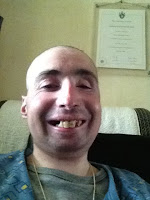 |
| This is me following my haircut! |
Send me an e-mail!
 |
| This is me following my haircut! |
I’ve progressed a lot since I started my journey into Buddhism. Yes, I
learned a lot over these months. At the same time, the more I learn about Buddhism, the greater I realise how much I have to learn. Even if I feel genuinely connected to the practices of Buddhism such as meditation and mindfulness, I still make mistakes.
However, I can’t be unrealistic and expect to be perfect in my practice. As long as I’m still alive, I will falter one time and more. In fact, I will probably keep committing mistakes as long as I live. Yet, I have embraced the Buddhist point of view because it resonates with me on a deeper level. I really can’t really explain this but I rejoice in discovering Buddhist philosophy.
To be completely honest, I was always interested in learning more about science and religion when I was a young boy. I also felt there was something more in life than just the material existence. And, being ascribed a physical impairment and, later, learning of my dead brother did help me reflect on my own mortality and impermanence of life.
In addition, back then, I had a passion for astronomy. I felt humbled and somehow saddened by the thought that we were the only ones who inhabited this vast universe. At least, that’s what I was expected to believe. But, still, I doubted this was really true but sounded rather arrogant and an anthropocentric (human-centred) view. Of course, I would not know what that word really meant at such a young age.
My life, I guess, was one characterised by the need to know and a need to understand. I had the opportunity to travel a lot with my family when I was a child. It was then I first encountered different cultures and people having a different faith than the one I was brought up in (Roman Catholicism). I realised that I was no that different from these people but somehow persisted to think of myself as better than they were.
But when I gained more experiences of the real world, I became painfully aware that because of my impairment, people did judge me before they got to know me. Yes, it was an unpleasant experience but it did help me look beyond the prejudices and assumptions people made about those who were different than them.
How does my Buddhist practice have to do with all this?
The truth of the matter is that thanks to a daily practice of meditation and mindfulness, I feel connected to my origins - to my authentic being. I try to be more careful on how I relate with others and more aware of my thoughts and actions. I realise that if I claim to believe that I should practice compassion, my commitment should be reflected in my actions as well.
For, holding on to principles without putting them into practice is pointless and a betrayal of our authentic being. In short, principles without practice are just not enough!
I close this post with a quote from the HH the 14th Dalai Lama, which I have come to cherish when I read it for the first time:
“If you want to be happy- practice compassion,
If you want others to be happy - practice compassion.”
HH The 14th Dalai Lama (b. 1935)